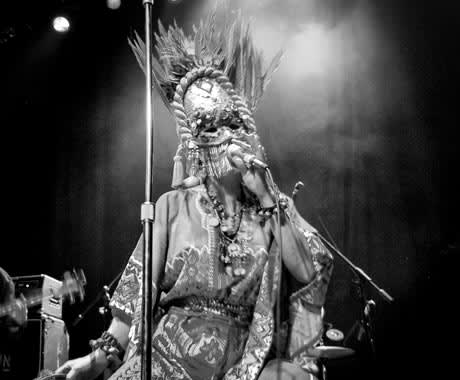This evening presented two extremes of the psychedelic spectrum. First up was Holy Wave, a quintet of multi-instrumentalists from Austin, Texas, the home of the Reverberation Appreciation Society that released their latest record, Relax, and the world-leading psych fest that curates it. Playing Vancouver for the first time, they seemed uptight, perhaps a little burned out. Everyone but the drummer swapped instruments in their creation of hypnotic shoegaze slow jams and organ-laden lysergic dirges, but, aside from the odd vocal line, their songs were an exercise in Philip Glass-like repetition, with all songs ending about the same as they began (and were in the middle). Their sound was good, heavily influenced by surf and drone, but they needed to loosen up a bit, take it farther into the hazy abyss.
Goat, on the other hand, are about as far from hypnotic as possible. Where Holy Wave invited introspection, this recently Sub Pop-signed collective was an explosive exposition of divine ecstasy, a ritualistic trance inspired as much by Afrobeat and bhangra as Krautrock and black metal. Think Secret Chiefs 3 if they stuck to and focused on traditional psych-rock instrumentation.
With their identities shrouded in mystery, allegedly hailing from the voodoo-cursed village of Korpilombolo in Sweden, Goat performed as a septet: two guitarists, a drummer in a summer hat and handkerchief, a bassist in a burka, a djembe drummer who looked like an evil scarecrow and two women in feathered headdresses and dashiki dresses up front. Playing for just over an hour, covering pretty much all of their recorded material between their 2012 debut album World Music and their 2013 single, their performance synergy was obvious from the moment they hit the stage.
Goat cooked up a complex and tasty batch of world soul stew, working a large part of the crowd into a churn, while musky human odors wafted across the room. Their extended rhythm section kept it propulsive and locked down on the low end, while the guitarist in a plain gold mask showcased his masterful style, playing frantic, staccato riffs inspired by Indian raga and West African guitar, and the guitarist in a hangman's hood found room to lay down spaced-out wahs like a blanket over their diasporic jams. No matter how long they extended their album cuts, they were always on the rise, always with dramatic inflection and punctuation.
The enchantresses up front provided much of the performance, though. They embodied every sound, shimmying with shakers, tambourines and chimes whenever they weren't incanting in unison, chucking errant feathers into the crowd, or leaping around ecstatically as if possessed by the great spirit of music.
It remains to be confirmed how much of Goat's backstory is truthful or what all the assimilated cultural imagery means, but in Goat's case, the meaning is in the music itself, the medium is the message and the mystery is icing on the cake. Regardless, Goat would hurt themselves if they rocked any harder, and that is powerful enough in itself to steal the fire of the gods in the name of humanity.
Read our recent interview with Goat here.
Goat, on the other hand, are about as far from hypnotic as possible. Where Holy Wave invited introspection, this recently Sub Pop-signed collective was an explosive exposition of divine ecstasy, a ritualistic trance inspired as much by Afrobeat and bhangra as Krautrock and black metal. Think Secret Chiefs 3 if they stuck to and focused on traditional psych-rock instrumentation.
With their identities shrouded in mystery, allegedly hailing from the voodoo-cursed village of Korpilombolo in Sweden, Goat performed as a septet: two guitarists, a drummer in a summer hat and handkerchief, a bassist in a burka, a djembe drummer who looked like an evil scarecrow and two women in feathered headdresses and dashiki dresses up front. Playing for just over an hour, covering pretty much all of their recorded material between their 2012 debut album World Music and their 2013 single, their performance synergy was obvious from the moment they hit the stage.
Goat cooked up a complex and tasty batch of world soul stew, working a large part of the crowd into a churn, while musky human odors wafted across the room. Their extended rhythm section kept it propulsive and locked down on the low end, while the guitarist in a plain gold mask showcased his masterful style, playing frantic, staccato riffs inspired by Indian raga and West African guitar, and the guitarist in a hangman's hood found room to lay down spaced-out wahs like a blanket over their diasporic jams. No matter how long they extended their album cuts, they were always on the rise, always with dramatic inflection and punctuation.
The enchantresses up front provided much of the performance, though. They embodied every sound, shimmying with shakers, tambourines and chimes whenever they weren't incanting in unison, chucking errant feathers into the crowd, or leaping around ecstatically as if possessed by the great spirit of music.
It remains to be confirmed how much of Goat's backstory is truthful or what all the assimilated cultural imagery means, but in Goat's case, the meaning is in the music itself, the medium is the message and the mystery is icing on the cake. Regardless, Goat would hurt themselves if they rocked any harder, and that is powerful enough in itself to steal the fire of the gods in the name of humanity.
Read our recent interview with Goat here.
